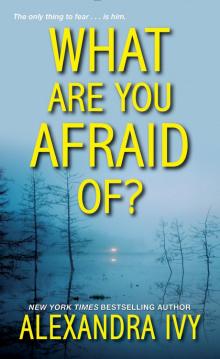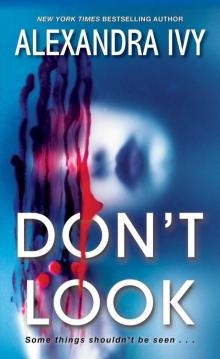- Home
- Alexandra Ivy
Faceless Page 3
Faceless Read online
Page 3
“Or maybe there was no reason,” she agreed. “I understand the picture doesn’t offer answers. Just more questions.”
Noah slowly rose to his feet, his hand brushing the tangled blond hair from her cheek. Wynter was never a sleek, sophisticated woman. She didn’t wear designer clothes or spend hours at a salon having her hair styled or her nails painted. One of his old girlfriends had called her a bohemian and he’d realized that it was a word that captured Wynter perfectly.
She was unconventional, creative, and as ephemeral as a summer mist. She was also as committed to the protection of the environment as he was. He’d been impressed by her decision to build greenhouses on her grandfather’s farm and use the bounty to create her restaurant, along with a farmers’ market. Others in town had mocked her “hipster” style, claiming the good, solid folks of Larkin would never enjoy cherry chutney on their sandwiches or veggie hash for breakfast.
They were wrong.
Within a year, Wynter had a booming business that other restaurants in town could only envy.
It was a success she’d worked hard to achieve. He wasn’t going to let anything distract her.
“Don’t do this, Wynter,” he murmured softly.
“Do what?”
He cupped her cheek in the palm of his hand. It wasn’t a caress. Not exactly. It was supposed to be a soothing gesture, even if he couldn’t resist savoring the feel of her satin skin.
“You’ve accepted your mother’s death. You’ve built a wonderful life and business,” he reminded her. “And more importantly, you’ve become a woman who would make your mother proud.”
She glanced down at the picture clutched in her hand. “You think I should toss this in the trash?”
“I spent years trying to find a reason for my parents’ death. The thought it was just some random accident made me so angry.”
She nodded. “I remember.”
His lips twisted. She was referring to his outbursts during the grief counseling group they’d shared. That had only been the tip of the iceberg. His poor grandmother had endured years of his petulant moods and deliberate attempts to strike out at everything and everyone who tried to get close to him.
“You should also remember that it wasn’t until I accepted that fate wasn’t fair—that good people died and shitty people lived, and that there wasn’t any rhyme or reason to it—that I could put the past behind me,” he said.
“Grim.”
“Actually it’s freeing,” he insisted. “I didn’t have to spend my nights lying awake trying to figure out why I was being punished. Or fearing that if I wasn’t good enough or smart enough, someone else I loved was going to be taken from me.”
Her features softened with regret that she’d forced him to remember his painful past. “I get that. I truly do.” She shook her head. “But this is different.”
Noah battled his urge to continue the argument. Wynter was kind and gentle and stubborn as a mule. “How?”
A sadness touched her face. “I don’t blame myself for my mother’s death.”
“But?”
“But I wonder if there was more involved than just a random mugging.”
“Does it matter?”
She paused, as if truly considering his question. “Yeah,” she at last said. “It matters.”
Noah resisted the urge to grab the photo and flush it down the toilet. There was no way to make Wynter forget what she’d seen. He had to somehow convince her to let it go. “You know, when I first started attending group counseling, I envied you.”
Wynter looked surprised. “Why?”
“Because you grieved your mother, but you’d accepted her death,” he told her. “You weren’t constantly seeking answers to why she was dead.”
“I was four when she died. I didn’t understand for a long time she wasn’t coming home.” She shrugged. “I was too busy learning how to grow up without a mom to wonder why she’d been taken from me.”
“So why look for questions now? It won’t change the past.”
“No, but it might change the future.”
“Not in a good way.”
She heaved a sigh. “Stop being so reasonable.”
His fingers drifted down her cheek, tracing the line of her jaw. “What do you want from me?”
“To listen.”
Noah forced himself to nod. As much as he wanted to insist that nothing good could come from tearing scabs off old wounds, he wasn’t her therapist. He was her friend. And friends listened. “I can do that.”
Wynter stepped back, holding up the photo. “Sheriff Jansen kept this photo for twenty-five years. Why?”
“The criminal was never caught, was he? Maybe he thought it might help to eventually ID the perp.”
She pointed toward the fuzzy outline of the mugger. “Noah, this figure in the photo is nothing more than a dark smear. There had to be better images on the video,” she insisted. “And why the question on the back? He obviously believed there was something strange about the shooting.”
Noah frowned. Did she have a point? This particular image captured the criminal pointing his gun at Laurel Moore, her handbag clearly clutched in his free hand. Laurel had her arms up, as if assuring the mugger that she didn’t intend to cause any trouble. It would have been easy enough for him to turn around and disappear into the surrounding darkness.
“What do you intend to do?” he asked.
“I’m not sure.” She chewed her lower lip. “I wish the sheriff was still here.”
“Why don’t we go back to Larkin and you can think about it?” he urged. Once she was home she might put the past where it belonged. In the past.
She shook her head. “First I want to talk to Tillie Lyddon.”
“Who?”
“She was the cashier at the station the night my mother was shot,” Wynter explained.
“Why would you want to talk to her?”
“When I read the police report—”
“Hold on,” he interrupted, feeling a jolt of shock. “You read the police report?”
She nodded as if it was the most natural thing in the world for her to have seen the intimate details of her mother’s murder.
“I found it in my father’s office. I was curious.”
He clicked his tongue. “You know what they say about curiosity.”
She offered a winsome smile. “It’s who I am.”
It was. She was an avid reader, she traveled to historical sites whenever she had the time, and she devoted herself to treating her customers as if they were her family.
“Tell me what bothered you about the cashier.”
“She claimed she was alone in the station and that she’d gone into a storage room,” Wynter said. “It wasn’t until she heard the shots that she realized a crime had been committed and ran outside to find my mother dead and the mugger already gone.”
“And?”
She lifted the photo and pointed toward the gas station in the background. It was barely larger than a shed with a huge window painted with the words SHELL GAS STATION, and a glass door.
“Who is that looking out of the window?”
* * *
Wynter sensed Noah’s tension, even if she didn’t fully understand it. Okay, she was probably on a wild-goose chase. There’d never been any reason to suspect that her mother’s death was anything but a statistic. Just one more victim of senseless crime.
Not until she’d opened the envelope.
Still, it wasn’t like she was making wild accusations or leaping to conclusions. She agreed with Noah that there were a dozen reasons the criminal might have pulled the trigger. Fear. Drugs. Insanity ...
But there was no way she could return to Larkin without asking a few questions. Sheriff Jansen had been a trained lawman. If he was troubled by something in the photo, then she owed it to her mother to at least try to discover more about what happened that night.
Stopping by the motel office to check out, Wynter asked directions to Tillie
Lyddon’s house. The middle-aged woman didn’t hesitate to offer a detailed map along with a pleasant smile, despite the murders that had recently devastated Pike. Small towns never changed.
Ten minutes later she was pulling her truck to a halt in front of a small, prefab house with a narrow porch and a side deck that was sagging beneath the weight of boxes, plastic containers, and at least two moldy mattresses.
“This must be it,” Noah murmured, leaning forward to peer out the front windshield.
Wynter wrinkled her nose. Even with the morning sunlight she felt a small shiver race through her. “It’s sad, isn’t it?”
Noah sent her a puzzled glance. “The house?”
“Yes.”
“I’m not sure it has emotions, but I’ll admit it looks run-down.”
Wynter continued to study the windows that were blocked by thick curtains and the yard that was cluttered with trash.
“Houses might not have emotions, but they reflect the people who live inside,” she insisted. “This one is sad. Neglected. Unloved.”
His dark gaze swept over her face, an indulgent amusement softening his features before he was out of the truck and headed toward the front porch. “Let’s go see what she has to say.”
Wynter had to scramble to catch up, barely reaching his side before he pounded on the door. From inside they could hear the sound of a TV turned on loud enough to leak through the thin walls, but there was no response. Noah pounded again. And again.
“Christ, keep your pants on,” a voice called out before the front door was being jerked open.
A woman not much taller than Wynter stood on the threshold, wearing an old robe that fell to her knees and a pair of worn slippers. Her frizzy hair was dyed black and her thin face deeply lined, revealing years of smoking. Her eyes were gray and hard with suspicion as she took in first Noah and then Wynter.
She smelled of cigarette smoke, coffee, and stale regret.
“Yeah?” she demanded in a hoarse voice. As if she wasn’t used to speaking.
“Tillie Lyddon?” Wynter asked.
“I’m Tillie.” The woman who looked as if she was in her late fifties scowled. “I suppose you’re from the sheriff’s office?” She didn’t wait for Wynter to respond. “Tell that bitch to get off my back. I’m waiting on a dumpster to start cleaning.”
“I’m not from the sheriff ’s office,” Wynter assured her.
“Oh.” The woman furrowed her brow before releasing a sharp, ugly laugh. “Then I suppose you’re looking to squeeze money out of me for some worthless cause. Tough luck. I ain’t got nothing to squeeze.”
Wynter shook her head. “I’m not here for money.”
The woman’s expression hardened with suspicion. “Then what do you want?”
“I was hoping I could ask you a few questions.”
“Is this a survey?” The scowl was replaced with a sudden burst of greed. “Do I get paid? I won’t take less than twenty-five bucks. My time’s worth that.”
Again Wynter shook her head. “I’m Wynter Moore.”
“And?” Tillie snapped. “Is that supposed to mean something to me?”
“My mother was Laurel Moore.” Tillie’s eyes were blank at the mention of her mother’s name and Wynter swallowed a sigh. There was one way to jog the woman’s memory. “She was shot at the gas station where you were working twenty-five years ago.”
Tillie flinched, as if Wynter had physically struck her. “What is this?” she hissed. “Some sort of joke?”
“No, Ms. Lyddon. I’m in Pike to visit my mother’s grave—”
“Look, I’m going to tell you exactly what I told that damned sheriff the hundred times he questioned me,” Tillie interrupted, her shock replaced by an ugly anger. “I saw nothing. I was in the storage room when the bastard shot your mother. I’m sorry, I can’t help you.”
Wynter didn’t know what she’d expected. Perhaps confused memories after so much time had passed. Or even a reluctance to discuss an event that must have been traumatic for everyone involved.
But not this fury.
Did Tillie fear that Wynter blamed her for not having done more to protect her mother?
Wynter pulled the photo out of the envelope she clutched in her hand. “I have a picture.”
“Whoopie doo for you.” Tillie stepped back, her face red and her eyes dark with an emotion that Wynter couldn’t read. “I got a door. And a lock.”
Wynter hastily shoved her hand out, waving the photo beneath the woman’s nose. “This was just before my mother was shot. There’s a person standing in the window, watching it happen.”
Tillie stiffened, her gaze instinctively lowering to the photo that was nearly touching her nose.
“I don’t see anything,” she muttered.
Wynter reached to point at the gas station. “Right there.”
“It’s a shadow.”
“It’s you,” Wynter insisted.
Tillie roughly shoved Wynter’s hand away. “You can’t prove that.”
“I can’t, but the photo can. All I have to do is have it enlarged and then cleaned up. There’s software now that can do miracles with old pictures.” She made the claim with more bravado than facts. She’d read an article about apps capable of fixing blurry pictures, but she had no idea how they worked or exactly how good they were.
Tillie licked her lips, her hand going to the pocket of her robe to pull out a pack of cigarettes. “Someone must have come into the station while I was in the storage room.”
“Who?” Wynter pressed. “You surely saw them when you heard the shots and came out to discover what had happened.”
“Go away,” Tillie snapped, stepping back.
“But—”
The door slammed in Wynter’s face. Next to her, Noah muttered a low curse, grabbing her hand to pull her back toward the truck.
“She’s lying,” Wynter said, her tone challenging him to deny the obvious truth.
Noah grimaced, glancing back at the cluttered house. “Yes. She’s lying.”
Chapter 4
Tillie lit her cigarette, taking nervous drags as she paced between the stacks of magazines and empty pizza boxes. She shouldn’t have answered the door.
It was ironic, really.
After quitting her job at the gas station twenty-five years ago, she’d gone on disability and hidden herself in this house. She’d refused every effort from her friends and family to convince her to leave unless it was the most dire circumstances. That was also when she’d lost interest in housekeeping.
She’d always been messy. She worked long hours on her feet; who could blame her if the last thing she wanted to do was mop the floors or clean toilets? But it wasn’t until after the shooting that shit really went downhill. She had all the time in the world to clean, but the thought of tackling the growing piles of trash was exhausting. Plus there was an odd sense of safety as the magazines towered higher and higher, and the bags stuffed with garbage blocked the windows. Eventually she was confined to one small spot on her couch where she could see her TV. And a narrow path that led to her bathroom.
She was hidden. Protected from the memories of what had happened that night.
And so she’d clung to her crap until the damned sheriff had arrived and pounded on her door.
It hadn’t been the old sheriff. Not the one who’d hounded her with questions about the killing. It had been a younger woman with a sour temper who threatened to have her evicted if she didn’t clean up the property.
The woman claimed the neighbors were complaining about rats and the smell of rotting garbage.
Tillie had been furious.
This was her house. She’d inherited it after her parents died. She could do what the hell she wanted with it. This was America, wasn’t it? Land of the free?
Except the sheriff had started throwing around words like “city fines” and “fire marshals” and “condemning” her home.
The thought of being forced out of her fortress and le
ft exposed ... It horrified her.
So when the knock had come on the door a few minutes ago she’d forced herself to answer it. She couldn’t afford to piss off the authorities. Her fingers were shaking as she took a deep drag off the cigarette, filling her lungs with hot smoke and a sense of calm.
“Everything’s going to be okay,” she muttered, her voice rusty as an unused hinge. She winced, taking another drag. “Just fine.”
* * *
The Stranger watched the truck pull away before slipping past the piles of junk that guarded the side door.
This hadn’t been on the agenda. Tillie Lyddon had been satisfactorily silenced years ago. But things had changed. The secrets that had been buried were stirring, the festering shadows threatening to crawl out of the grave.
How could the Stranger trust Tillie?
The denials he’d overheard just minutes ago seemed genuine, but there was fear in her voice.
With the right pressure she would crack.
A risk that had to be eliminated.
The Stranger refused to admit to the tingle of anticipation. Or the eager pleasure that banished the gray dullness.
Business was business.
* * *
The diner wasn’t retro. It was just old. And dingy.
The dining area was a long, narrow room with booths on one side and tables next to the windows. The tiled floor had faded to a weird shade of pumpkin and the walls were covered by bumper stickers that had been collected over the past fifty years: DON’T POKE THE BEAR. SMILE. BE HAPPY. MY OTHER CAR IS A FERRARI. The front register was set on top of a glass cooler filled with meringue-topped pies and lemon bars, and the kitchen smelled of grease.
Still, it was reasonably clean, Wynter grudgingly conceded, and there were several customers gathered around the tables despite the fact that it was just eleven A.M.
Seated at a table near the back window, she watched as Noah wrinkled his nose and pushed away his half-eaten hamburger.
“Inferior to the lunches you serve,” he murmured. “It’s dry as cardboard.”
She rolled her eyes, but inside she felt a smug pleasure at his words. Her restaurant was her baby. Her pride and joy.
“Not every place can be a Wynter Garden.”

 Hakan/Severin
Hakan/Severin A Very Levet Christmas
A Very Levet Christmas Scorched by Darkness
Scorched by Darkness Out of Control
Out of Control My Lord Vampire
My Lord Vampire When Darkness Comes
When Darkness Comes Abandoned and Unseen
Abandoned and Unseen Ice/Reaux
Ice/Reaux Kill Without Shame
Kill Without Shame Sebastian/Aristide
Sebastian/Aristide Bound By Darkness
Bound By Darkness Angel/Hiss
Angel/Hiss Lian/Roch
Lian/Roch Kill Without Mercy
Kill Without Mercy First Rapture
First Rapture Burned by Darkness
Burned by Darkness Two to Go: Bayou Heat
Two to Go: Bayou Heat Predatory
Predatory The Real Werewives of Vampire County
The Real Werewives of Vampire County Darkness Eternal
Darkness Eternal Darkness Everlasting
Darkness Everlasting What Are You Afraid Of?
What Are You Afraid Of? Born in Blood
Born in Blood Darkness Revealed
Darkness Revealed Darkness Avenged
Darkness Avenged Buried and Shadowed
Buried and Shadowed Blade
Blade Pretend You're Safe
Pretend You're Safe Don't Look
Don't Look Bayon/Jean-Baptiste
Bayon/Jean-Baptiste Where Darkness Lives
Where Darkness Lives My Lord Eternity
My Lord Eternity My Lord Immortality
My Lord Immortality Blood Lust
Blood Lust Bayou Noël
Bayou Noël Supernatural
Supernatural Hunt the Darkness
Hunt the Darkness Blood Assassin
Blood Assassin One Down
One Down Shades of Darkness
Shades of Darkness Kayden/Simon
Kayden/Simon Sinful Rapture
Sinful Rapture Charred by Darkness
Charred by Darkness Faceless
Faceless Beware the Darkness
Beware the Darkness Sacrifice of Darkness: A Guardians of Eternity Novella
Sacrifice of Darkness: A Guardians of Eternity Novella You Will Suffer
You Will Suffer Talon/Xavier
Talon/Xavier Michel/Striker
Michel/Striker Conquer the Darkness
Conquer the Darkness Darkness Returns
Darkness Returns All About Levet
All About Levet Levet
Levet Raphael: Bayou Bites (Bayou Heat Book 1)
Raphael: Bayou Bites (Bayou Heat Book 1) Seducing the Viscount
Seducing the Viscount Bedding The Baron
Bedding The Baron On the Hunt
On the Hunt When You Wish
When You Wish Lord Mumford's Minx
Lord Mumford's Minx Fear the Darkness (Guardians of Eternity)
Fear the Darkness (Guardians of Eternity) Bayou Heat Collection One
Bayou Heat Collection One Yours for Eternity
Yours for Eternity Lord Carlton’s Courtship
Lord Carlton’s Courtship Sinful Rapture (The Rapture Series)
Sinful Rapture (The Rapture Series) Darkness Unleashed
Darkness Unleashed 1001 Dark Nights: Bundle Twelve
1001 Dark Nights: Bundle Twelve The Wedding Clause
The Wedding Clause A Vampire Bundle
A Vampire Bundle Born in Blood (The Sentinels)
Born in Blood (The Sentinels) Rage/Killian
Rage/Killian Hakan/Séverin
Hakan/Séverin Bayon Jean-Baptiste
Bayon Jean-Baptiste Love and Marriage
Love and Marriage Pretend You’re Safe
Pretend You’re Safe GOE 08 - Bound By Darkness
GOE 08 - Bound By Darkness Dragons of Eternity Collection
Dragons of Eternity Collection Stolen and Forgiven
Stolen and Forgiven Scorched by Darkness (Dragons of Eternity Book 2)
Scorched by Darkness (Dragons of Eternity Book 2) One Down: Bayou Heat (Pantera Security League Book 1)
One Down: Bayou Heat (Pantera Security League Book 1) A SENTINEL LOVE STORY
A SENTINEL LOVE STORY Ice Reaux
Ice Reaux Here Comes the Bride
Here Comes the Bride Bayou Heat Collection Two
Bayou Heat Collection Two When Darkness Ends
When Darkness Ends A Vampire Bundle: The Real Werewives of Vampire County, When Darkness Comes, Real Vamps Don't Drink O-Neg, & Hunted by the Others
A Vampire Bundle: The Real Werewives of Vampire County, When Darkness Comes, Real Vamps Don't Drink O-Neg, & Hunted by the Others My Lord Eternity (Immortal Rogues)
My Lord Eternity (Immortal Rogues) One Down_Bayou Heat
One Down_Bayou Heat Miss Frazer's Adventure
Miss Frazer's Adventure Charred By Darkness (Dragons of Eternity Book 3)
Charred By Darkness (Dragons of Eternity Book 3) Embrace the Darkness
Embrace the Darkness Guardians of Eternity 03 - Darkness Everlasting
Guardians of Eternity 03 - Darkness Everlasting Two To Go
Two To Go Blade_A Bayou Heat Novella
Blade_A Bayou Heat Novella Kayden/Simon (Bayou Heat Novellas)
Kayden/Simon (Bayou Heat Novellas) Beyond the Darkness
Beyond the Darkness Raphael Parish
Raphael Parish Lian/Roch (Bayou Heat)
Lian/Roch (Bayou Heat) When Darkness Falls
When Darkness Falls Taken by Darkness
Taken by Darkness Rage/Killian: Bayou Heat Novellas (1001 Dark Nights Book 5)
Rage/Killian: Bayou Heat Novellas (1001 Dark Nights Book 5) Devoured By Darkness
Devoured By Darkness A Very Levet Christmas (Guardians of Eternity)
A Very Levet Christmas (Guardians of Eternity)